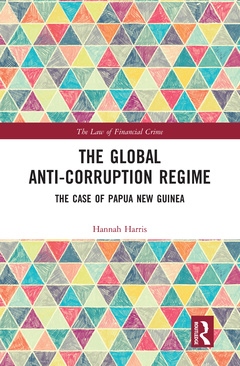The Global Anti-Corruption Regime The Case of Papua New Guinea The Law of Financial Crime Series
Auteur : Harris Hannah

This book tackles the challenging topic of corruption. It explores the evolution of a global prohibition regime against corrupt activity (the global anti-corruption regime). It analyses the structure of the transnational legal framework against corruption, evaluating the impact of global anti-corruption efforts at a national level. The book focuses on the United Nations Convention against Corruption (UNCAC) as the primary tool of the global anti-corruption regime. It provides new and engaging material gathered in the field, including first-hand accounts from actors at international, regional, and domestic levels. By documenting the experiences of diverse actors, the book makes a substantial contribution to literature on corruption and anti-corruption efforts. Synthesising empirical research with an exploration of theoretical literature on corruption and regime evolution results in novel suggestions for improvement of the global anti-corruption regime and its legal tools.
The Global Anti-Corruption Regime is a well-rounded text with a wealth of new information that will be valuable to both academic and policy audiences. It clarifies the factors that prevent current anti-corruption efforts from successfully eliminating corrupt activity and applies the five-stage model of global prohibition regime evolution to the global anti-corruption regime. It will be of interest to researchers, academics, policymakers, and students interested in anti-corruption law, comparative law, transnational criminal law, international law, international relations, politics, economics, and trade.
Introduction; 1: Setting the Stage - Corruption and the Global Anti-Corruption Regime; 2: The United Nations Convention against Corruption - The Primary Tool of the Global Anti-Corruption Regime; 3: Corruption and Anti-Corruption in the South Pacific Context - Key Actors, Values, and Interests; 4: The Case Study of Papua New Guinea; 5: Experience from the Field - Insight into the Implementation and Enforcement of the United Nations Convention against Corruption in Papua New Guinea; 6: Seeking Answers - Understanding the United Nations Convention against Corruption and its Role in Papua New Guinea; 7: The Final Question - Possibilities for the Future and Concluding Remarks;
Dr Hannah Harris is a legal research specialist focusing on transnational dynamics that impact law and policy. She teaches in the Faculty of Law at the University of New South Wales Sydney and is also a freelance data scientist.
Date de parution : 06-2020
15.6x23.4 cm
Date de parution : 08-2018
15.6x23.4 cm
Thèmes de The Global Anti-Corruption Regime :
Mots-clés :
Combat Corruption; Implementation Review Mechanism; Corruption; Anti-corruption Efforts; Global Anti-Corruption Regime; PNG Context; UNCAC; South Pacific Region; Anti-Corruption; Global Prohibition Regime; Anti-Corruption Law; PNG’s Experience; Papua New Guinea; Implementation Review Process; PNG; Multilateral Legal Instrument; Comparative Law; Royal PNG Constabulary; Transnational Criminal Law; PNG Case; International Law; Anti-corruption Framework; International Relations; Multilateral Lending Institutions; OECD Convention; PNG Government; Illicit Enrichment; Criminogenic Asymmetries; Civil Society; Corrupt Activity; Corrupt Incentives; Chapter Iii; OAS Convention; South Pacific States; Domestic Non-state Actors



